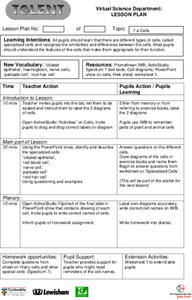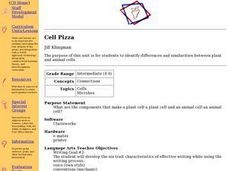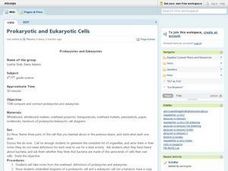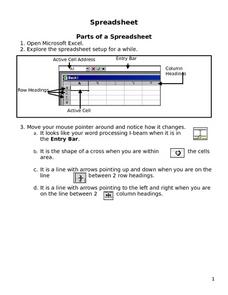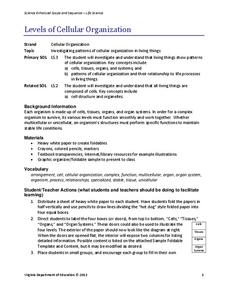Curated OER
Parts of a Cell
Students explore the parts of a cell. They identify the structures of plant and animal cells. Students explain the functions of plant and animal cells. They compare and contrast animal cells to plant cells. Students create a model of the...
Curated OER
P.L.E.P: Parts of Blood
Students examine the different parts of blood. In this human blood lesson students work in groups and identify parts of blood and construct a model of human blood.
Curated OER
Cells
Students explore the types of cells and their appropriate function. After observing a PowerPoint presentation, students draw diagrams of cells. Using a specified website, students identify parts of plant and animal cells. They answer...
Curated OER
Cells Study Questions and Definition
In this cells worksheet, pupils define 14 words associated with cells. They answer 12 short answer questions about the structure and function of the cellular system.
Curated OER
Cells in the Making
Young scholars examine and research the parts of a cell, their functions, and life processes. They simulate how cells receive nutrients using coffee filters, water, and coffee, and construct cells using pudding, cookie dough, and candy.
Curated OER
Seeing Cells
Learners discuss what comes to mind when they hear the term cell and discuss what a cell is in biological terms. They look at pictures of cells and color a picture of a cell diagram, writing the job of each part as they go. After the...
Curated OER
Cell Structure and Function
Students complete research to find cell structure and the functions of all of a cell's organelles. They complete a variety of online reinforcement activities surround cell structure and function.
Curated OER
Hands-on Cells
Students review the components of a cell and the differences between plant and animal cells by creating a three-dimensional model of each type of cell. In small groups, they use modeling clay and household object to construct their models.
Curated OER
Cell Pizza
Students identify parts and functions of microscope. Students watch video, Cells and Life about cell parts with actual pictures and actual cells. Students discuss video and identify parts of the cells that animals and plants have in...
Curated OER
Prokaryotic and Eukaryotic Cells
Students compare and contrast prokaryotes and eukaryotes. They name the organelles that are present in prokaryotes only and identify their functions. Students label the diagrams of the prokaryotic cell and the eukaryotic cell.
Curated OER
The Incredible, Edible Cell
Students discover organelles and the functions organelles perform in cells. For this biology lesson, students create model cells using Jell-o, then dissect their "cell" to examine the parts that create a cell. Students create a diagram...
Curated OER
Stem Cell Bioethics
Pupils study the steps of embryonic development. They distinguish between the advantages/disadvantages of embryonic stem cells vs. adult stem cells and discuss the ethical implications of stem cell research.
Curated OER
Cell Project
Students view a video of various cells and organelles. They create a 3-dimensional representation of a cell (complete with organelles) out of everyday objects that function in the same way as the various parts of the cell.
Curated OER
Plant Structure, Function and Growth
Students study three structures of a plant as well as their locations and functions. In this botany lesson students complete several activities on plant organs and their functions.
Baylor College
What Is a Neuron?
Your class won't get on your nerves while doing this modeling activity! After teaching the structure and function of a neuron using the included diagrams, give individuals some clay and chenille stems so that they can make their own...
Science Matters
Hierarchy
A system is only as good as the sum of its parts! Young scholars explore the components of the different body systems using a hands-on lesson. The lesson helps learners build an understanding that there is a hierarchy of components in...
Teach Engineering
Android Acceleration
Prepare to accelerate your Android. Pupils prep for the upcoming activity in this third installment of a four-part series. The lesson progresses nicely by first introducing different types of acceleration to the class. The teacher...
Curated OER
Cell Organelles and Their Functions
Pupils will be using Inspiration, which is a graphic organizer computer program, to create their own model community where they will label the community parts with the corresponding organelle. They will have prior knowledge of cell...
Curated OER
Parts of a Spreadsheet
Young scholars experiment with the basic functions of a spreadsheet. They practice using headers, footers, functions and fonts. They also organize information.
Curated OER
Parts of a Spreadsheet
Students create their own spreadsheet. They identify the different parts that make up a spreadsheet and organize their data. They practice using functions and formats.
Virginia Department of Education
Levels of Cellular Organization
What an eccentric way to learn about each level of cellular organization! Allow emerging biologists to utilize white paper and create their own foldable charts to describe each level of organization in the body. You may also adapt the...
Nuffield Foundation
Observing Water Moving Through Plants
We know plants assist in the water cycle, but how do plants get water from the ground into the air? Through a series of demonstrations or labs, scholars observe the movement of water through plants. They microscopically view the cells...
Curated OER
Games and Activities to Teach Molecular Genetics
Students demonstrate a working knowledge of cell interactions such as DNA replication, protein synthesis (transcription and translation), through active participation in a cooperative group.


